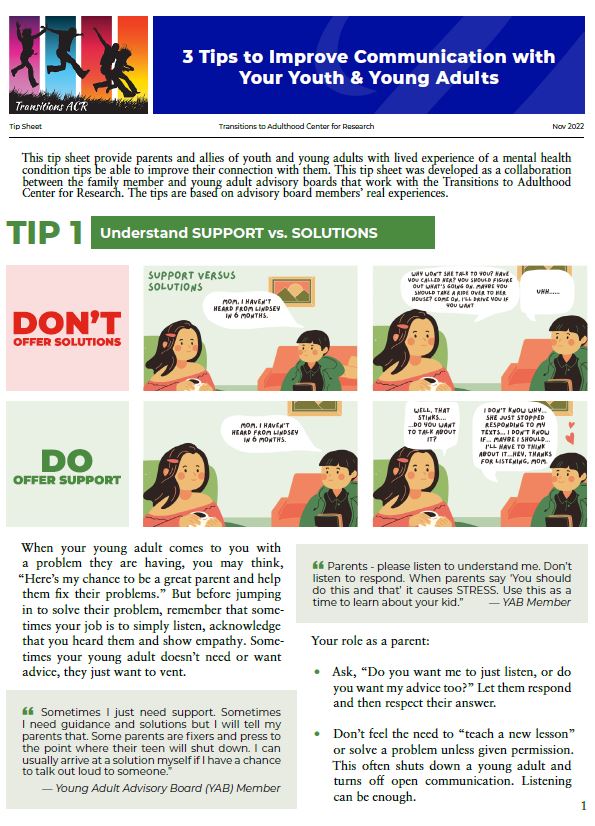3 Tips to Improve Communication With Young Adults [downloadable]
 This tip sheet provides parents and allies of youth and young adults with lived experience of a mental health condition tips to be able to improve their connection with them.
This tip sheet provides parents and allies of youth and young adults with lived experience of a mental health condition tips to be able to improve their connection with them.
It can be hard for parents or guardians of youth and young adults (ages 14–26) to connect with the young people they care for. Creating a relationship through casual conversation can help to foster trust and open dialogue between a parent or guardian and the young person they want to connect with. By building this relationship, it can open the door for a young person to go to the parent or guardian when they have concerns or need advice. This tip sheet was developed as a collaboration between the family member and young adult advisory boards that work with the Transitions to Adulthood Center for Research. The tips are based on advisory board members’ real experiences.
Tip 1: Understand support vs. solutions
When your young adult comes to you with a problem they are having, you may think, “Here’s my chance to be a great parent and help them fix their problems.” But before jumping in to solve their problem, remember that some- times your job is to simply listen, acknowledge that you heard them and show empathy. Sometimes your young adult doesn’t need or want advice, they just want to vent.
Your role as a parent:
- Ask, “Do you want me to just listen, or do you want my advice too?” Let them respond and then respect their answer.
- Don’t feel the need to “teach a new lesson” or solve a problem unless given permission. This often shuts down a young adult and turns off open communication. Listening can be enough.
Tip 2: Have “goodwill conversations” 80-90% of the time
“Goodwill conversations” have no agenda and can help strengthen your relationship. The topics can be varied but the focus is not your child nor your relationship.
- These conversations are not about “them,” so defensiveness, anxiety, annoyance are minimized.
- Have “goodwill” conversations through everyday life.
Take opportunities for one-on-one non-threatening conversations, like discussing a favorite podcast on the drive to school or recipes you want to try while cooking dinner. - Be curious. Ask their opinions about things like a local news story, sports teams, upcoming events, funny memes.
- Be a “curious anthropologist” and listen without the need to say anything other than “Well, that’s interesting” or “Tell me more.”
- Find “family time” activities like watching a show together, pizza night, or a shared hobby.
- Parents also can build connections with their young adults by having no conversation at all. Sometimes your young adult isn’t in a place where they want to talk. Just being together can be a way to build a good relationship.
Tip 3: Keep “Problem Solving Conversations” to 10 – 20% of your talk time
Problem Solving Conversations: These conversations have an agenda of forward progress on a specific issue.
Many parents have a running agenda of issues they want to resolve with their young adult. But try and keep these “problem solving” conversations to only 10-20% of your time with your young adult. These types of conversations may cover topics like: employment, school grades, concerns about unhealthy behaviors, chores, concerns about friend choices.
When you have a problem you’d like resolved, your role as a parent is to pay attention, be an active listener, be in control of your own feelings, direct the conversation but know when to step back, and make sure your YA doesn’t feel “double-teamed” if you are there with a partner.
- It helps to begin with a request for a conversation and/or a timeframe. “I have something I’m struggling with that I want to talk with you about. It should only take 10 minutes. Can we talk now?”
- A car ride may be a great place for “good- will conversations” but is not a good place for problem solving conversations (unless initiated by your young adult).
- Collaborate — Involve your young adult with identifying problem and solution and be consistent. Ask what they need and involve them in defining the problem.
- Support good ideas.
- Assume neutral intent and stay neutral if you can. If emotions get too intense, your young adult may shut down.
- Let your young adult know you want to understand what is going on for them when appropriate.

Source: UMass Chan Medical School | 3 Tips to Improve Communication With Young Adults, https://www.umassmed.edu/TransitionsACR/publication/life-skills/tip-sheets/2022/12/3-tips-to-improve-communication-with-ya | Copyright © 2022 UMass Chan Medical School. Republished with permission (CC BY-NC 4.0)
Do you need someone to talk to? To schedule an evaluation or to get advice, call or email a CHC Care Coordinator at 650.688.3625 or careteam@chconline.org CHC teletherapy services are available now.





